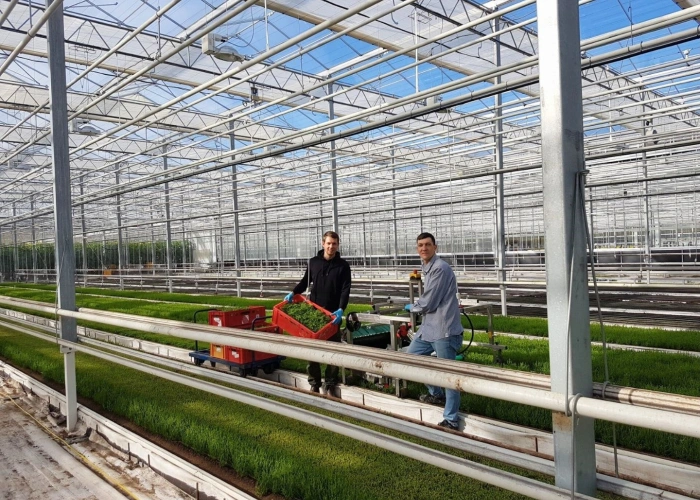Sea asparagus: Superfood from Osterweddingen

OSTERWEDDINGEN. A nationwide unique project is now becoming part of Bördegarten: On July 1, the company of the Wimex Group from Köthen (Saxony-Anhalt) took over commercial cultivation of sea asparagus (Salicornia europaea) from the start-up “Salifaktur.” The green, leafless salt plant, also known as glasswort or sea asparagus, is considered a promising superfood due to its high content of vitamins and minerals. In the wild, Salicornia typically grows on seashores or in highly saline soils where conventional crops cannot thrive. The start-up had already moved its sea asparagus cultivation in early 2023 into Bördegarten’s high-tech greenhouse in Osterweddingen near Magdeburg. Now, the Salicornia project is also being integrated at the company level into Bördegarten and thus into the Wimex Group. “We are always looking for exciting development opportunities,” says Ulrich Wagner, Managing Director of the Wimex Group. “Salifaktur’s business idea is a perfect fit for us. Sea asparagus is versatile and ideally complements our portfolio. We are delighted to now cultivate this superfood centrally in Germany.”
Building know-how on Salicornia from scratch
The beginnings of Salicornia cultivation go back to 2020, when founders Julian Engelmann and Ken Dohrmann searched for a niche in vegetable growing to start their own business — and discovered sea asparagus. “We became aware of it through experiments by a fellow student,” recalls Ken Dohrmann. “Our research showed that there was no cultivation of Salicornia in Germany.” This gave the two founders a unique position in the vegetable market but also meant they had to develop all the practical know-how themselves. Their only support came from a Belgian expert as a project partner. Eventually, they launched the innovation project “Salt Plants from Saxony-Anhalt,” funded within the framework of the European Innovation Partnership (EIP-AGRI).
In mid-2022, Engelmann amicably left the project. Agricultural scientist and trained farmer Dohrmann stuck with the concept, searched for a new partner, and found Bördegarten. “The collaboration began on December 1, 2022, with preparatory construction work in the Bördegarten greenhouse,” he recalls. “Within just eight weeks we were able to start cultivation.” Today, Salicornia grows on 1,600 square meters in the greenhouse, with a weekly yield of around 400 kilograms.
Fresh momentum for Salicornia cultivation
From the very beginning, the Salicornia project benefited from cooperating with Bördegarten, says Dohrmann. “Even just the personnel support for cultivation and maintenance helped a lot,” he explains. “We also learned from the professional workflows in one of Germany’s most modern greenhouses. And we were now able to grow year-round, use logistics, and gain new marketing opportunities through sales contacts and Bördegarten’s network. Harvesting and selling Salicornia takes place in a very short time window, after all, it must reach customers fresh and crisp.”
Dohrmann remains an employee of Bördegarten and the Wimex Group, continuing to oversee sea asparagus cultivation and marketing. “By growing sea asparagus, we are expanding our portfolio. Alongside classic vegetables, we are increasingly focusing on innovations. We hope Salicornia will become more popular in kitchens across Germany,” says Michael Tepfer, Head of Strategic Business Development at Wimex. At present, the company mainly supplies the gastronomy and hotel trade, especially in the fish and seafood sector, where Salicornia is traditionally served. “We also supply a small number of regional restaurants and are regulars at the Magdeburg weekly market,” adds Dohrmann. In the future, the vegetable will also be available in retail.
A future plant for human nutrition
This means more consumers will soon be able to prepare and enjoy sea asparagus at home. “The tips of the salt plant are harvested and processed; they can be eaten raw, fried, or blanched,” explains Dohrmann. “Anything that benefits from salt or herbs also benefits from sea asparagus. It tastes great in salads, with fried potatoes, or as a salty topping on bread with butter.” Some enjoy pairing the salty snack with sweet fruits or nuts.
The benefits of sea asparagus go beyond the culinary: because the plant thrives on saline soils, it makes previously unusable land available for agriculture and thus for human nutrition. Salicornia even flourishes in areas temporarily flooded by the sea. “In our Bördegarten greenhouse,” says Dohrmann, “we use natural salt from deposits around Magdeburg to optimally fertilize the plants.”